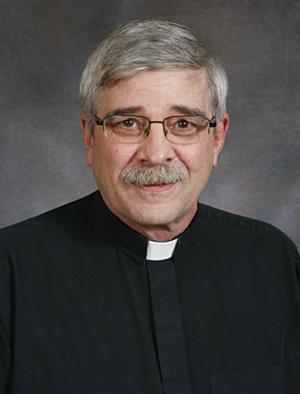As Angels Do Above

Rev. Timothy Teuscher
by Timothy Teuscher
On the last Sunday in September and October this year, there are two significant days on the church calendar: the festival of St. Michael and All Angels (September 29) and the observance of Reformation Day (transferred to October 27). The First Reading appointed for Reformation Day, Revelation 14:6-7, ties, in a sense, both of these days together: “Then I saw another angel flying over head, with an eternal gospel to proclaim to those who dwell on earth, to every nation and tribe and language and people. And he said with a loud voice, ‘Fear God and give him glory, because the hour of his judgment has come, and worship him who made heaven and earth, the sea and the springs of water.’”
There are two things in particular that we would do well to consider and take to heart in light of these words in connection with these two festivals: namely, the proclamation of the Gospel and the worship of the one true God.
Now, the word angel itself literally means “messenger;” more specifically, a messenger of, for, and from the Lord who proclaims His Law and His Gospel. So St. Paul says concerning the giving of the Ten Commandments to Moses: “It (the Law) was put in place through angels by an intermediary” (Galatians 3:19). And then, the Gospel—the birth of Jesus (Luke 2:10-12) and His resurrection (Luke 24:4-7)—was first proclaimed by angels, messengers from heaven.
But not only heavenly angels. Those who have been called to proclaim that same Word of God are also “angels” or “messengers” (e.g., Revelation 2:1, 8, 12). So Martin Luther says, “This word ‘angel’ is commonly applied in Scripture to all messengers of God, whether they are the holy angels in heaven or prophets and apostles on earth. Therefore all who proclaim His Word are God’s angels or messengers.” And for good reason. After all, there is only one truth, one Word of God, one saving, eternal Gospel, whether it be preached by angelic heavenly messengers or by human earthly ones.
There is only one truth, one Word of God, one saving, eternal Gospel, whether it be preached by angelic heavenly messengers or by human earthly ones.
On the other hand, any other “Gospel” comes not from God but instead from that fallen angel, the Devil—“a liar and the father of lies” (John 8:44), as Jesus calls him. That is why the apostle Paul sounds this word of warning: “Even if we or an angel from heaven should preach to you a gospel contrary to the one we preached to you, let him be accursed” (Galatians 1:8).
In his final sermon, Luther said: “True preachers must carefully and faithfully teach only God’s Word and must seek its honour and praise alone. In like manner, the hearers must say: We do not believe in our pastor; but he tells us of another Master, One named Christ. To Him he directs us; what His lips say we shall heed. And we shall heed our pastor insofar as he directs us to this true Master and Teacher, the Son of God.”
In addition to proclaiming the Gospel, angels also participate with the church on earth during worship. When we join together in prayer, as Luther makes the point on the basis of Revelation 8:3-4, the angels present our prayers before the throne of God and augment and amplify our pleas with prayers of their own.
When the Gospel is proclaimed in your congregation, angels from heaven are also in attendance. After all, that the “Son of the Father Now in flesh appearing” (LSB 379.2), that “God, the mighty maker, died For His own creatures’ sin” (LSB 437.3) is so amazing that even angels “long to look” into these things (1 Peter 1:12).
When a repentant sinner hears and receives and believes the Absolution pronounced by God’s earthly messengers, “there is joy before the angels of God over one sinner who repents” (Luke 15:10).
When through Holy Baptism little children enter the kingdom of heaven, “their angels always see the face of my Father who is in heaven” (Matthew 18:11).
When we gather together for worship, we do so with proper reverence and decorum and respect “because of the angels” (1 Corinthians 11:10) who are gathered with us.
When Holy Communion is celebrated in our congregations, the angels, who are always in the presence of the glorified risen Christ, are also with us as we partake of His body and blood as a foretaste of the feast to come perpetually in heaven. So we sing in the hymn: “The sacrament God gives us Binds us in unity, Joins earth with heav’n beyond us, Time with eternity” (LSB 639.3).
When songs and hymns are sung in our worship services, we sing only those that are Bible-based and Christ-centered, including songs of the angels themselves in our common liturgy (the Gloria in Excelsis, the Sanctus, or “This Is The Feast”). We sing with them: “Therefore, with angels and archangels and with all the company of heaven, we laud and magnify Your glorious name, evermore praising You and saying…”
The Scriptures have much more to say about angels, but the above, it seems to me, is reason enough to pray often the Third Petition of the Lord’s Prayer, “Thy will be done on earth as it is in heaven.”
———————
Rev. Timothy Teuscher is President of Lutheran Church–Canada.





